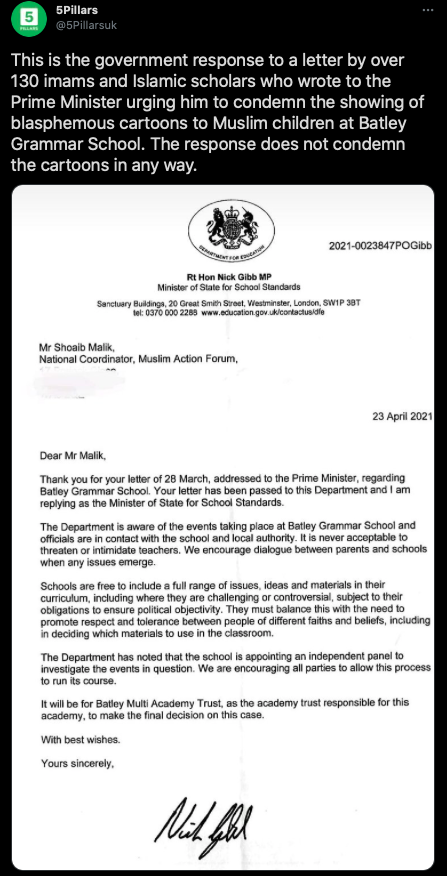At the end of March, a teacher at Batley Grammar School in West Yorkshire was suspended following a religious studies lesson in which the teacher showed cartoon depictions of the Prophet Muhammad. Despite the school issuing a statement of apology, parents have protested against the use of offensive cartoons . The situation has generated widespread publicity and opinions about the case, with respondents divided along questions relating to freedom of speech, censorship and cultural sensitivity. A month on from the incident, Batley Multi Academy Trust has launched an independent campaign in order to “examine how certain materials, which caused offence, came to be used”1.
The response to the use of Cartoons
According to a statement released by the Muslim Council of Britain (MCB) , the cartoons shown to students play into the Islamophobic trope of “Muslims and/or Islam being synonymous with terrorism, and Muslims having a unique penchant for violence”2. The images used were in fact taken from the French satirical newspaper Charlie Hebdo, which has inspired terrorist attacks and incited further debates around depictions of the Prophet Muhammad and freedom of speech.
Regarding the case of Batley Grammar School, Mohammad Sajad Hussain, founder of local charity called Purpose of Life, said in a public statement he was “deeply hurt” by the “insulting caricatures of our beloved Prophet Muhammad”, and further stated his charity will be unwilling to continue working with the school until the teacher was permanently removed”3. Other Muslim organisations, such as Ahmadiyya Muslim Community UK, have also spoken out against the distress and impact such images can cause. For example, in a 2015 a survey conducted by the Ahmadiyya Muslim Youth Association on young people’s attitudes towards Muslims in the UK, revealed that 31% of young children surveyed agreeing with the statement that “Muslims are taking over England”4.
In addressing the impact of these images, the Muslim Council of Britain drew upon the National Education Union’s guidance on the responsibility of teachers “duty of care” towards their pupils. For the MCB this duty of care should be inclusive of, and extend to, “safeguarding children from becoming marginalised, or being victimised […] in the current climate of increased hostility towards Muslim – and indeed BAME – school children”5. Further statistics reported from Childline in 2017, revealed that they had held approximately 2,500 counselling sessions for children as a direct result of race or faith based bullying. They also stated that children as young as nine years of age reported being called terrorists and enduring threats of violence and abuse6. For many, the use of cartoons would only further the victimisation of Muslim students. Parents of students at the school, who argued there was no other way to address the issue, took to protesting, with both the MCB and Sayeeda Warsi (a member of the House of Lords) arguing that there needs to be a “close engagement between schools and parents regarding issues on the national curriculum”7, and issues of blasphemy can be taught differently.
The school itself issued a televised statement in which they “unequivocally apologise for using a totally inappropriate image”9, and further argued whilst it was important for “children to learn about faith and beliefs. [yet] This must be done in a respectful, sensitive way”10. These words and actions were echoed and supported by Tracy Brabin, the local MP. However, for some, the school’s apology and teacher’s suspension are indicative of an attack on free speech. The National Secular Society called the protest by parents an “attempt to impose an Islamic blasphemy taboo on a school” and the former leader of the far-right UK Independence Party (UKIP) Henry Bolton tweeted: “Those people protesting outside the school in batley need to accept that Great Britain is secular. We have no laws on blasphemy, there is no right to be offended and they have no right to demand otherwise”11.
The use of Charlie Hebdo cartoons and other caricatures, as previously stated, are far from an isolated event and have been subject to widespread controversy before across Europe. For example, in October 2020 Samuel Paty, a school teacher near Paris, was subjected to an online hate campaign, and eventually murdered, after showing cartoons of the Prophet Muhammad to his class12. French President Emmanuel Macron, defended the use of cartoons, saying he “won’t renounce the caricatures” and they are protected under the right to free speech13. Unlike Macron, the UK Prime Minister Boris Johnson has not released a public statement in regards to the use of cartoons at the school. This has led to 130 Imams and Islamic scholars writing to the Prime Minister to urge him to condemn the use of cartoons. However, as tweeted by 5Pillars at the end of April, the response from the Minister of State for School Standards, was far from satisfactory. The National Secular Society, although in defence of the use of cartoons, has also critiqued the Department of Education for “washing their hands” of the situation.

Instead of any government intervention, the Batley Multi Academy Trust has launched its own external investigation, undertaken and lead by an independent barrister. The result of the investigation is expected at the end of May 2021, with further recommendations to be made to school in relation to the future of the Religious Studies curriculum.
Sources
https://www.batleygrammar.co.uk/docs/BMAT_Statement.pdf
https://www.bbc.co.uk/news/newsbeat-36346886
https://www.bbc.co.uk/news/world-europe-54625270
https://www.dw.com/en/france-muhammad-cartoon-row-what-you-need-to-know/a-55409316
https://mcb.org.uk/community/mcb-responds-to-developments-at-batley-grammar-school/






